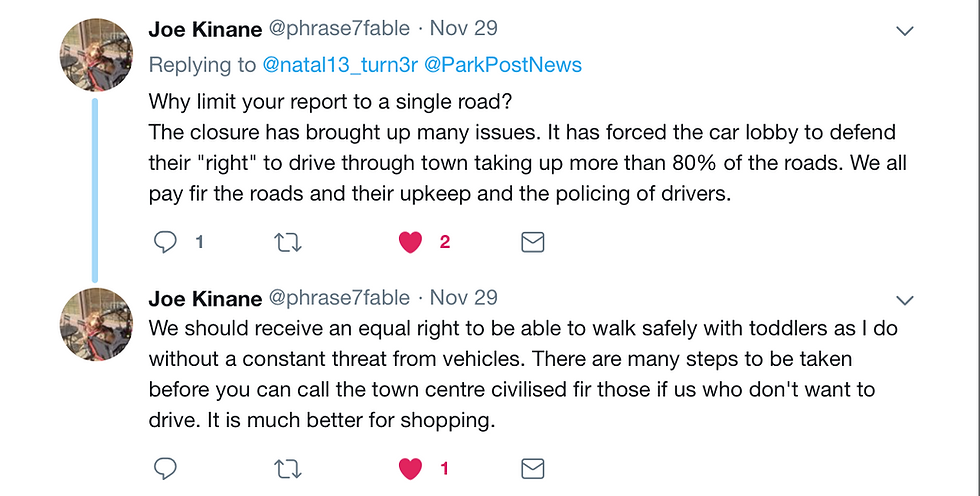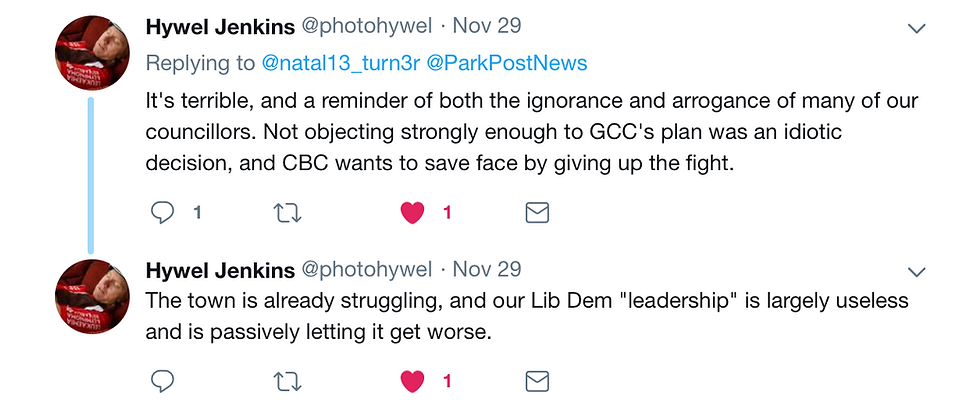Was Boots made for walking?
- Natalie Turner
- Dec 13, 2018
- 5 min read
The conflict on Boots Corner: Should it be pedestrianized? Or should it be re-opened and given back to the motorist?

We all know how it feels to get aggravated when sitting in traffic, or the feel of frustration when we are running late for work. Many of us may take quicker routes to avoid the rush hour traffic. Now imagine your one and only shortcut being taken away from you, and you're forced around a one-way system with thousands of other cars, which adds up-to an hour onto your journey. You can probably imagine the road rage and outright chaos. This was only the starting point of a major conflict that began when Boots Corner closed its roads.
Boots Corner is the heart of bustling Cheltenham, Boots Corner would see up to 13,000 vehicles a day driving through the centre of town. Picture Cheltenham as a large circular racetrack, Boots Corner is the shortcut running through the middle of the circuit which allows cars easy access to main roads such as the A46 and A4019. The road runs through the high-street, which doesn’t make it very pedestrian friendly, but allows a good flow of traffic for vehicles coming from most areas of Cheltenham.
Boots Corner closed on the 28th June 2018, and has been causing much controversy amongst drivers, residents, and the council. Since the closure, all vehicles have been banned from driving through this area. The road now belongs to pedestrians, taxis, buses and cyclists. As part of the Cheltenham Transport Plan, Boots Corner is under-going an 18-month trial closure. This is so Cheltenham Borough Council can experiment its success, analyze pollution and trade, and will decide at the end of the trial whether the closure stays permanent.
The council argues that the bigger picture of the closure is to benefit the town centre environment, with an improvement in air quality, less pollution, better traffic management, and a boost in the local economy. Boots Corner has become a pedestrianized area that’s seen new developments and upgrades such as new seating, planters, cycle racks, a newly installed fountain and even astro-turf lawn. There’s even been talk of new sculptures such as decorated pigeons! All sounds rather lovely and pleasant doesn’t it? But is everyone happy about it?

While the council spends £4,629 on artificial grass, and harping on about pedestrianizing Cheltenham high-street. There have been protests, business trade being negatively affected, motorists being fined due to lack of signage, school roads becoming more dangerous due to increased traffic in other areas, and the emergency services struggling to get through congested roads. The protest that took place got a lot of media attention, it made national news and featured in the The Guardian and Observer. The Conflict Project spoke to Rob Chandler, the leader of the protest against the closure. Rob Chandler has said "disabled people are struggling to get into town and park to do their shopping. Drivers are also doing dangerous maneuvers to avoid the camera trap, so they are reversing down the one-way street and driving up the pavement. Boots Corner needs to be re-opened, unless the council can come up with a suitable solution on how they can connect the south with the north of Cheltenham". There have been many causes for concern expressed by residents, motorists, and business owners, but are these objections being taken seriously by the council? Or are they simply knee-jerk reactions to change?
What has the council got to say about this?
In an exclusive interview with the mayor, Councillor Bernard Fisher said "The closure of Boots Corner is the first step towards a sustainable transport system". He also expressed his thoughts that "it would be unlikely that boots corner will reopen again". He spoke about the council not putting any contingency plans in place until the end of the 18-month trial closure, but there are plans to improve traffic in the Cheltenham Transport Plan. In regards to the congestion, the mayor said “people are working it out”.
The Conflict Project invited Councilor Andrew McKinlay and former councilor Adam Lilywhite who is now a concerned business owner to the University of Gloucestershire for an interview. Councillor Andrew McKinlay discusses the positive impact the closure has on Cheltenham and the first steps of implementing the Cheltenham Transport Plan. While Adam Lilywhite, puts forward a compelling argument of why the closure of Boots Corner is quite the opposite.
Councilor Andrew McKinlay & concerned business owner have conflicting views
In the interview, McKinlay starts by explaining the initial reason the council closed Boots Corner, he said "This is to improve congestion and pedestrianize the high-street". McKinlay also talks figures regarding improvements that the council has been monitoring. He said, “We’ve seen an 80% increase in pedestrians crossing Boots Corner onto the lower high-street, and a 200% increase in cyclists using the road, and a 50% increase in wheelchair users.” McKinlay also goes onto say that pollution has decreased as whole around the town, and traffic has improved. He said, “Traffic has gone down from 13,000 vehicles to 1,500 which is a significant improvement”.
On the other hand, Lilywhite argues that the closure of Boots Corner is not making the area more pedestrianized or pollution free. He said, “The main issue is, is that it is nothing to do with traffic improvement, and it cannot be justified on traffic grounds.” Lilywhite said “Buses and taxis are still driving through which does not make this pedestrianized, traffic is being dispersed into other residential areas in Cheltenham increasing pollution”.
Lilywhite argues that the figures on increased pedestrians using Boots Corner, are in-fact statistics Gloucestershire County Council gave during peak time. Lilywhite said, “The figures which are given by Andrew McKinlay, which are given out for the increased footfall in the town, were dispelled by Gloucestershire County Council Highways Authority for peak time in July, when the world cup was on and it was absolutely roasting hot”.
The pair also differ in opinion about trade; McKinlay said "We've had a very small amount of businesses complain, and when challenged they haven't been able to demonstrate any loss of business at all". Whereas Lilywhite, a hotelier, has noticed a considerable impact on his own business due to the congestion.
When asked about the main cause of conflict, both interviewees were at odds with their replies. Lilywhite said "it is the greed of the council and down to the development of the Municipal Offices". While McKinlay said "the conflict is down to change, people’s routines have been disrupted and they are now having to learn new routes".
What do the public think?
The Conflict project took to twitter to ask the public about their thoughts on the closure of Boots Corner. There’s definitely been mixed feelings, some people feel it to be an improvement whereas others feel poor decisions have been made and the council need to re-think the entire closure. What are your thoughts?



















Comments